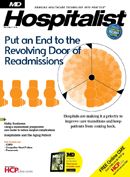Publication
Article
MDNG Hospital Medicine
Pneumonia
//Online CME
Preventing Pneumococcal Disease in Infants and Young Children
Credits: 0.75
Fee: None
Expires: September 19, 2011
Multimedia: Audio/slides
In this webcast, experts in pediatrics and infectious diseases review the rationale for an extended-coverage pneumococcal vaccine, the safety and recommended schedule of pneumococcal vaccine administration, and strategies for overcoming barriers to timely vaccination in infants and young children. Recent changes in the drug-resistant Streptococcuspneumoniae population are also discussed.
Starting Antiretroviral Therapy in a Middle-Aged Man with Cardiovascular Disease and Pneumonia
Credits: 0.75
Fee: None
Expires: October 11, 2011
Multimedia: None
After reading a series of case studies, participants in this activity will be able to more effectively apply HIV treatment guidelines regarding the choice of antiretroviral therapy for treatment-naive HIV patients; compare data on the efficacy of tenofovir versus abacavir; interpret baseline genotypic resistance test data to determine viral susceptibility to first-line agents; and assess clinical trial data regarding adverse effects related to antiretroviral agents when making individualized therapy choices.
//The Educated Patient
The CDC created this site to educate patients about pneumonia, a condition that causes more deaths than any other infectious disease, despite the fact that it is preventable and treatable. Here, patients can learn about the signs of pneumonia, which patient populations are most likely to develop the condition, how to reduce the risk of acquiring pneumonia, and the different types of pneumonia. Visitors to the site can also link to fact sheets about pneumonia, vaccines, and Pneumocystis carinii pneumonia, a severe illness found in people with HIV; send e-cards focusing on flu prevention and pneumonia; listen to CDC podcasts; and read guidelines for the diagnosis and treatment of pneumonia.
//Medical Websites
This chapter of The Disease Management Project, an online medical reference from the Cleveland Clinic, “provides basic information for the clinician” and reviews evidence-based guidelines from the American Thoracic Society and Infectious Disease Society of America for the management of health care-associated pneumonia (HCAP). Topics covered include the epidemiology of hospital-acquired pneumonia (HAP), the second most common nosocomial infection in the US; the pathogenesis and causes of HAP, ventilator-associated pneumonia (VAP), and HCAP; testing for and diagnosis of HAP; therapeutic guidelines and recommendations for assessing response to treatment; and prevention strategies.
//From the Literature
Increasing Adherence to Antibiotic Guidelines
The increased availability of antibiotic guidelines for physicians at the time of drug ordering using a computerized physician drug order entry system, combined with a periodical reinforcement educational round, appeared to result in enhanced physician adherence to these guidelines.
Vitamin D, Innate Immunity, and Outcomes in CAP
In hospitalized patients with community acquired pneumonia, 25-hydroxyvitamin D deficiency—but not antimicrobial peptide levels—was associated with increased 30-day mortality. However, vitamin D was not linked to levels of the antimicrobial peptide cathelicidin or beta defensin-2, contrary to what investigators hypothesized.
//Clinical Trials
- Can Gurgling Prevent Hospital-acquired Pneumonia?
- Doripenem vs Cefepime in Hospitalized Children with Bacterial Pneumonia
- Reducing Length of Stay for Veterans Hospitalized with Pneumonia
- Use of Procalcitonin Level to Guide the Treatment of Suspected CAP






